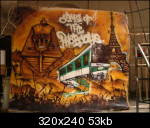THE CHALLENGE
 "In recent years, several strategies have been attempted to prepare omniphobic surfaces that repel both polar and apolar liquids. However, they are complex owing to the challenge of creating surfaces with ultra-low contact angle hysteresis, which is what causes liquids to bead and easily slide off a surface. One method is to covalently attach flexible groups onto smooth surfaces to create a slippery liquid-like layer. But this approach is usually time-consuming and involves complicated synthetic chemistry." writes James Urquhart in Chemistry World, house journal of the RSC The Royal Chemical Society,UK.
"In recent years, several strategies have been attempted to prepare omniphobic surfaces that repel both polar and apolar liquids. However, they are complex owing to the challenge of creating surfaces with ultra-low contact angle hysteresis, which is what causes liquids to bead and easily slide off a surface. One method is to covalently attach flexible groups onto smooth surfaces to create a slippery liquid-like layer. But this approach is usually time-consuming and involves complicated synthetic chemistry." writes James Urquhart in Chemistry World, house journal of the RSC The Royal Chemical Society,UK.
THE SOLUTION
Now Liming Wang and Thomas McCarthy at the University of Massachusetts, US, have devised a way to create such smooth and slippery coatings without complex synthetic chemistry and long reaction times. Their method so simple it involves just one step and takes minutes to achieve at room temperature.
Super-repellent coating ready in seconds | Chemistry World






